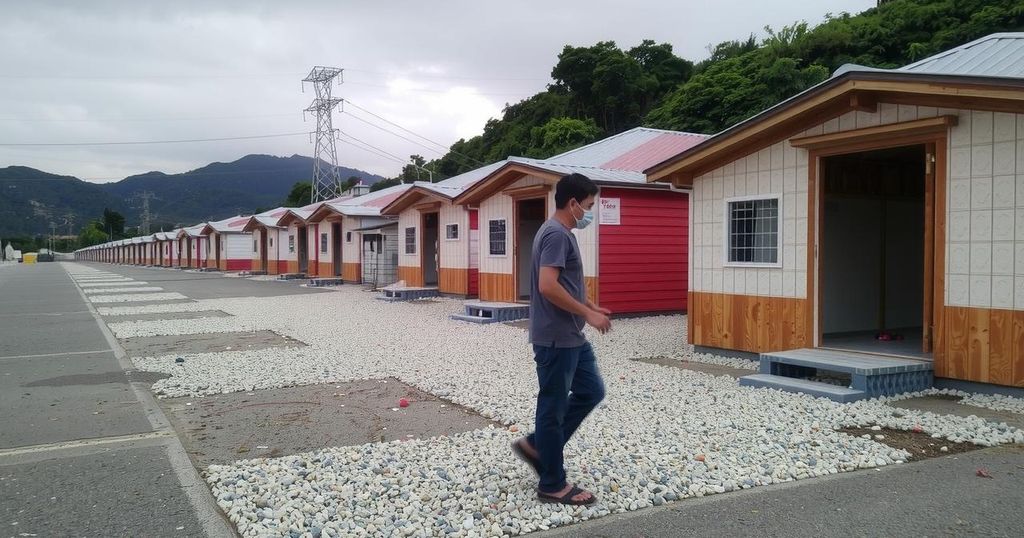Noto Peninsula Residents Face Uncertainty One Year After Devastating Quake
The Noto Peninsula in Japan continues to suffer from the effects of a devastating earthquake that occurred on January 1, 2024, claiming nearly 470 lives and leaving many in temporary housing. Residents like Sueko Naka face uncertainty about their futures, with ongoing aftershocks and weather-related disasters exacerbating recovery challenges. The community is confronted with depopulation trends as residents seek stability amid reconstruction efforts that have been sluggish and fraught with obstacles.
The devastation wrought by the 7.5-magnitude earthquake on January 1, 2024, continues to reverberate through the lives of those residing on the Noto Peninsula in Ishikawa Prefecture, Japan. Among them is 83-year-old Sueko Naka, who had envisioned a tranquil life at home surrounded by her ancestors’ altar but now resides in a temporary accommodation with her husband and daughter. “When I imagine I might die here, I can’t sleep well,” she confesses, highlighting the psychological toll of their precarious living conditions.
This natural disaster, the deadliest to strike Japan in over a decade, claimed nearly 470 lives and caused extensive damage to buildings, historical sites, and personal lives. The communities are still plagued by aftershocks and devastating weather events, including record rainfall that resulted in severe flooding and additional fatalities. Currently, 200 residents are living in emergency shelters, while thousands more are in temporary housing, a far cry from the stability they once knew.
Infrastructure recovery is progressing slowly, with only a fraction of the damaged buildings in Wajima demolished thus far; the picturesque peninsula, once a vibrant community, now appears as a skeletal construction zone dotted with remnants of homes, many rendered uninhabitable. City officials express frustration over the relentless challenges posed by nature, stating, “But the torrential rain swept away everything, and people had to go back to square one.”
The emotional scars left by the earthquake and its aftermath are profound. Local residents, such as Chugo Maruyama, contemplate a potential future devoid of a thriving community, as depopulation trends continue to worsen, exacerbated by the recent calamities. The yearning for stability is palpable as families, once tightly woven, are now scattered across the region, while those remaining grapple with uncertainty and the fear of future disasters. Miyuki Kijima, Naka’s daughter, poignantly shares, “We want to repair our home and live there again, but what if it happens again after we repair it?”
The shared sentiment among residents underscores a troubling reality: the Noto Peninsula’s path to recovery remains steeped in uncertainty as the community collectively seeks a way to heal and rebuild. The future for many, particularly the elderly and vulnerable, is frazered by existential fears, acute loss, and memories of a home that was once a sanctuary.
The Noto Peninsula has been significantly affected by a major earthquake, marking a stark turning point in the lives of its residents. The earthquake, occurring on New Year’s Day, not only resulted in loss of life—nearly 470 fatalities—but also caused substantial structural damage to homes, historical landmarks, and critical infrastructure across the region. With ongoing aftershocks and varying weather challenges including unprecedented rainfalls, community recovery efforts have faced immense obstacles. Aged populations, such as Sueko Naka and her family, exemplify the psychological and physical toll of living in temporary accommodations while the threat of future disasters looms large. The situation has also ignited concerns over depopulation trends in the area, threatening the sustainability of the community.
In summary, the aftermath of the 2024 earthquake has left the Noto Peninsula in a state of continued distress, with significant challenges in recovery and rebuilding. The lives of residents like Sueko Naka and her family encapsulate the struggles faced by many who yearn for the familiarity of their homes while confronting an uncertain future. The ongoing fear of aftershocks and potential natural disasters underscores the urgent need for comprehensive support systems and rebuilding strategies to restore not just structures, but the very sense of community and belonging that has been irreparably altered.
Original Source: japantoday.com




Post Comment